
Top Natural and Homeopathic Remedies for Hay Fever: Say Goodbye to Allergy Symptoms!
Are you tired of hay fever wreaking havoc on your daily life? Well, you're not alone! With pollen, dust, and mites around every corner, it's no wonder many of us suffer from allergy symptoms like runny noses, itchy eyes, and sneezing fits. But don’t worry—in this blog, we're diving into the world of natural and homeopathic remedies to help you combat hay fever effectively.
From local honey to steam inhalation, there's a whole arsenal of natural tricks to tackle those irritating symptoms. Get ready to learn about some of the best ways to manage hay fever naturally!
BM188 is best used for hay fever, itchy and watery eyes, frequent sneezing, coughing, runny nose, post nasal drip and a scratchy, dry sensation in the throat.
What Is Hay Fever?
Hay fever, also known as allergic rhinitis, is a common condition caused by the body's immune system overreacting to certain substances in the air. These substances are called allergens and include pollen, dust mites, pet dander, and mold spores.
When you have hay fever, your immune system mistakenly identifies these harmless substances as dangerous invaders. In response, it releases chemicals like histamine to fight off the allergens. This causes inflammation in your nose, throat, eyes, and sometimes even your skin.
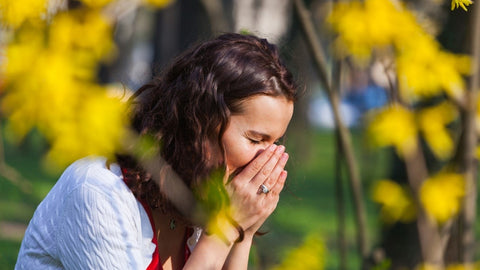
What Are the Symptoms of Hay Fever?
The symptoms of hay fever can vary from person to person, but they often include:
- Sneezing: Your body tries to expel the irritants by forcefully expelling air through your nose.
- Runny or stuffy nose: Your nasal passages may become congested or produce excess mucus.
- Itchy or watery eyes: The inflammation might make your eyes feel irritated, red, and watery.
- Itchy throat or ears: You may experience discomfort or itching in your throat or ears.
- Coughing: Postnasal drip, caused by excess mucus running down the back of your throat, can lead to coughing.
- Fatigue: Dealing with hay fever symptoms can make you tired and worn out.
BM26 is best used for allergic bronchitis, chest tightness, wheezing, bluish skin, exhaustion, grunting respiration and restlessness.
Hay fever symptoms can be seasonal, occurring during specific times of the year when particular allergens are prevalent, such as spring when trees and flowers release pollen. However, some people may experience symptoms year-round if they're allergic to indoor allergens like dust mites or pet dander.
Although hay fever is not usually dangerous, it can significantly affect your quality of life by disrupting your sleep, causing difficulty concentrating, and making you feel generally unwell. Fortunately, various natural treatments can help manage symptoms and improve your comfort during allergy season.
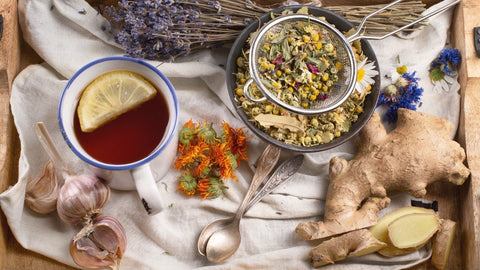
What Are the Benefits of Using Natural Remedies To Manage Hay Fever?
Using natural remedies to manage hay fever can offer several benefits:
- Reduced Side Effects: Natural remedies typically have fewer side effects than pharmaceutical ones. Many over-the-counter and prescription allergy medications can cause drowsiness, dry mouth, and other unwanted effects. On the other hand, natural remedies are often gentler on the body and less likely to cause adverse reactions.
- Holistic Approach: Natural remedies often take a holistic approach to health, addressing the symptoms of hay fever and underlying imbalances in the body. For example, herbal remedies and dietary supplements may support overall immune function and promote wellness beyond alleviating hay fever symptoms.
- Cost-Effectiveness: In some cases, natural remedies can be more cost-effective than prescription medications. While certain pharmaceutical allergy medications can be expensive, many natural remedies, such as saline nasal rinses or steam inhalation, are inexpensive and readily available. Additionally, some herbal supplements and dietary changes may offer long-term savings compared to purchasing allergy medications regularly.
- Customization and Personalization: Natural remedies allow for greater customization and personalization of treatment plans. Because each person's body responds differently to various remedies, individuals can experiment with different natural approaches to find what works best. This personalized approach can lead to more effective symptom management and improved overall well-being.
- Reduced Environmental Impact: Many natural remedies for hay fever involve using ingredients derived from plants or simple lifestyle changes, which can be more environmentally friendly compared to the production and disposal of pharmaceutical drugs. Choosing natural remedies may align with sustainable living practices and reduce your environmental footprint.
- Empowerment and Self-Care: Natural remedies can empower you to take control of your health and become more involved in your well-being. By learning about natural remedies and making lifestyle changes, individuals with hay fever can feel more in control of their symptoms and better equipped to manage them daily.
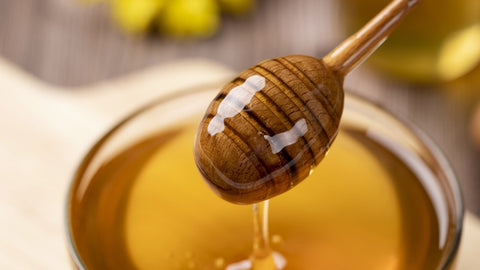
The Top 10 Natural Remedies for Hay Fever
Here are some natural remedies for hay fever that may help alleviate symptoms:
1. Local Honey: Some people believe that consuming local honey, which contains small amounts of pollen from local plants, can help desensitize the body to allergens over time. While scientific evidence is limited, some individuals report symptom relief from regularly consuming honey.
2. Quercetin: Quercetin is a plant pigment (flavonoid) found in certain foods like apples, onions, and berries. It's believed to have anti-inflammatory and antihistamine properties, which may help reduce hay fever symptoms.
3. Vitamin C: Vitamin C is an antioxidant that may help boost the immune system and reduce inflammation. Foods rich in vitamin C include oranges, strawberries, kiwi, and bell peppers. Consuming these foods may help support overall health and potentially alleviate hay fever symptoms.
4. Butterbur: Butterbur is a herbaceous plant native to Europe, Asia, and North America. Some studies suggest that butterbur extract may help reduce symptoms of allergic rhinitis, including sneezing, nasal congestion, and itchy eyes. However, it's crucial to choose a standardized butterbur extract.
5. Saline Nasal Rinse: Nasal irrigation with a saline solution can help flush out allergens and mucus from the nasal passages, relieving congestion and irritation. You can use a neti pot or a saline nasal spray to perform a nasal rinse. To prevent infections, use sterile water and follow proper hygiene practices.
6. Steam Inhalation: Inhaling steam can help moisturize and soothe irritated nasal passages, relieving congestion and promoting easier breathing. Adding a few drops of essential oils like eucalyptus or peppermint enhances the steam's decongestant properties. Be cautious not to get too close to hot steam to avoid burns.
7. Local Pollen Forecast: Keeping track of local pollen forecasts can help you plan outdoor activities on days with lower pollen counts, reducing exposure to allergens and potential hay fever symptoms.
8. Probiotics: Probiotics are beneficial bacteria that support gut health and immune function. Some research suggests that certain strains of probiotics may help reduce the severity of hay fever symptoms by modulating the immune response. You can find probiotics in fermented foods like yogurt, kefir, sauerkraut, and kimchi, or take probiotic supplements.
9. Acupuncture: Acupuncture, a traditional Chinese medicine practice involving the insertion of thin needles into specific points on the body, has been suggested as a potential treatment for hay fever. Some studies indicate that acupuncture may help alleviate hay fever symptoms by regulating immune responses and reducing inflammation.
10. Local Plant-Based Medicine: Some herbal remedies derived from plants may help alleviate hay fever symptoms. For example, extracts from the herb known as stinging nettle (Urtica dioica) have been traditionally used to treat allergies due to their potential anti-inflammatory and antihistamine properties. Nettle supplements or teas are available in health food stores and may provide relief for some individuals.
While these natural remedies may relieve some individuals, it's essential to remember that they may not work for everyone, and their effectiveness varies from person to person.
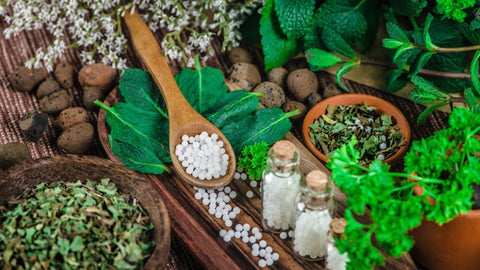
How Can Homeopathy Provide Support?
Homeopathy is an alternative medicine system that believes in the principle of "like cures like." This means that a substance that causes symptoms in a healthy person can be used in a highly diluted form to treat similar symptoms in an unwell person. Remedies are prepared by repeatedly diluting a substance in water or alcohol and shaking it vigorously, which is believed to enhance its healing properties.
Homeopathy aims to stimulate the body's self-healing mechanisms and address the underlying causes of the allergic response in hay fever. Homeopathic remedies for hay fever are chosen based on the specific symptoms experienced by the individual, as well as their overall health and constitution.
Homeopathic remedies are gentle and safe for most people, including children and pregnant women. They are generally well-tolerated and have minimal risk of adverse effects or interactions with other medications.
Homeopathic remedies may help reduce the body's sensitivity to allergens over time, decreasing the frequency and severity of hay fever symptoms. Homeopathy aims to address the root cause of allergic reactions rather than simply alleviating symptoms by strengthening the body's immune system and restoring balance.

The Top 5 Homeopathic Remedies for Hay Fever
The following are five common homeopathic remedies for hay fever:
1. Allium cepa (Onion):
- Symptoms: Watery discharge from the nose with burning and stinging sensations is accompanied by bland discharge from the eyes, which causes redness and swelling. Symptoms worsen in warm rooms and improve in cool, open air.
- Use: Allium cepa is often recommended for hay fever symptoms, characterized by profuse, watery discharge from the nose and eyes and burning sensations.
Allium Cepa is designed to support your body when dealing with sneezing, runny nose, and watery eyes.
2. Arsenicum album (Arsenic):
- Symptoms: Nasal discharge is thin and watery, causing a burning sensation and irritation. Sneezing is frequent and violent, with a feeling of exhaustion and restlessness. Symptoms worsen at night and improve with warmth.
- Use: Arsenicum album is indicated for hay fever symptoms involving thin, watery nasal discharge, intense sneezing, and restlessness or anxiety.
Arsenic Alb is designed to support your body in recovery from food poisoning and vomiting.
3. Euphrasia officinalis (Eyebright):
- Symptoms: Profuse and acrid discharge from the eyes causes burning, itching, and sensitivity to light. Nasal discharge may be bland or watery, and frequent sneezing occurs. Symptoms worsen in the open air and improve indoors.
- Use: Euphrasia is commonly used for hay fever symptoms with prominent eye irritation, including redness, itching, and watering, along with nasal congestion and sneezing.
- Symptoms: Nasal discharge is thin and watery, like egg white, and the nose feels dry and irritated. Sneezing is frequent, especially in the morning, and worsens with exposure to sunlight. Symptoms improve at the seaside or with rest.
- Use: Natrum muriaticum is recommended for hay fever symptoms characterized by thin, watery nasal discharge, sneezing, and dryness or irritation in the nose.
Nat Mur is best used for any dryness or wetness on the body. It may help with diarrhea, runny nose, vomiting, dry, painful throat, and more. Useful for weight loss, delayed menstruation, coldness, dyspepsia, eczema, neuralgia, and anemic patients.
5. Sabadilla (Cevadilla Seed):
- Symptoms: Violent and spasmodic sneezing, often in rapid succession, with profuse, watery discharge from the nose. Eyes may be watery and itchy, with a sensation of pressure or fullness in the sinuses. Symptoms worsen in cold air and improve indoors.
- Use: Sabadilla is indicated for hay fever symptoms with intense sneezing fits, watery nasal discharge, and itching or watering of the eyes, often accompanied by sinus pressure.
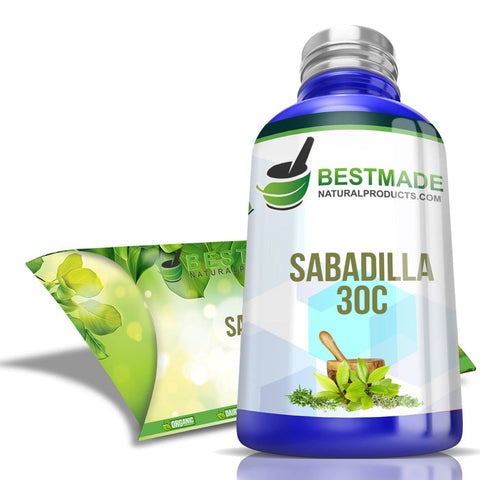
Sabadilla is designed to support your body when dealing with hay fever, allergies, and sneezing.
6. BM188 (Bestmade's Homeopathic Remedy for Hay Fever & Allergy):
- Description: BM188 is a homeopathic remedy to address hay fever and allergy symptoms, particularly those triggered by pollen, dust, and mite allergies. It supports common allergy symptoms such as runny nose, sneezing, coughing, sore throat, and itchy eyes.
- How to Use:
- Take 10-15 drops of BM188 3-4 times a day.
- Mix the drops in 8 oz of water before consumption.
- If you weigh less than 100lbs, use half the recommended dose.

The Bottom Line
With these natural and homeopathic remedies, you'll be ready to take on hay fever season like a pro. There are plenty of options to help you find relief from those pesky allergy symptoms.
Remember, listening to your body and finding what works best for you is essential. Feel free to experiment with different remedies and see what relieves you.
Cheers to a sniffle-free season ahead!

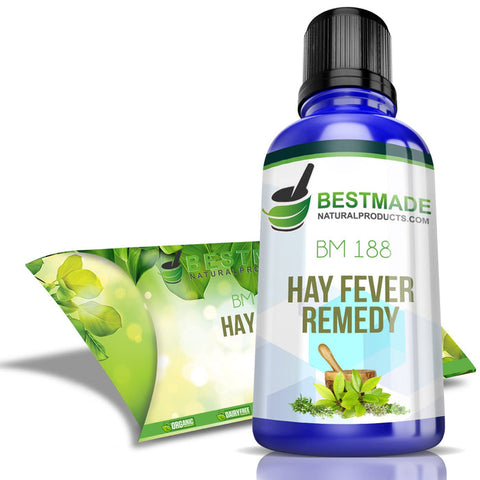
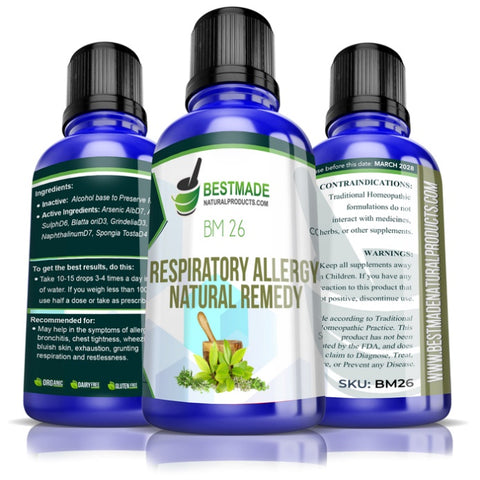

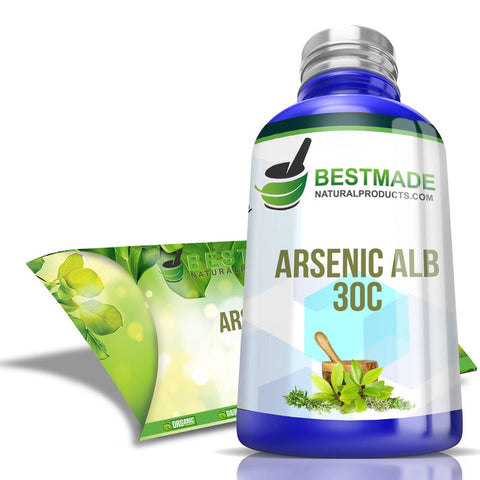

Leave a comment